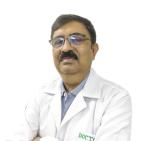
Heart Disease In Children – Now A Well Treatable Entity1
How to suspect that your child may be suffering from a heart disease?1
It is important that a suspected child with congenital heart disease is picked up at the appropriate time . The heart disease diagnosed in children at the right time ensures good long term results .The common symptoms that may help diagnose a congenital heart disease include:1
- does your child get repeated chest infections?
Frequent chest infections may be the only feature of heart disease in a child. Upper respiratory infections like common cold, mild cough or hoarseness are not related to heart disease Chest infections usually manifest with fever, fast breathing, indrawing of the chest and usually require antibiotics for recovery. More than one episode of lower respiratory tract infection in a year may be the only clue to the existence of congenital heart disease in a child.
- does your child have feeding problems?
Inability to take feeds at a single stretch especially when associated with sweating is an early manifestation of congenital heart disease. Feeding difficulty is considered to be present if the baby cannot such from the breast at a stretch for five minutes and becomes breathless during feeds. The baby may also sweat during feeds and stop after taking a small feed. The baby continues to be hungry and cries after every ½ to 1 hour for feeds.
- unsatisfactory weight gain?
Infants with congenital heart disease have poor feeding pattern and unsatisfactory weight gain.
- have you noticed that your child is not able to keep pace with his/her friends of the same age while playing?
This may indicate that a diseased heart cannot cope with the demands during exertion and competitive sports.
- have you noticed that your child is blue?
Blueness is an important indicator of heart disease. Blue babies always have severe form of heart disease. Earlier the blueness appears, the more serious is the heart defect. Some of the blue babies are prone to episodes of “Cyanotic spells” characterised by increase in the rate and depth of breathing with increase in blueness. This may go on to limpness, convulsion, or unconsciousness.
- Fast heart beating , Palpitations?
Palpitations or fast heart beat is a manifestation of certain forms of heart disease . if a ecg can be done during such episode is very diagnostic.
WHAT SHOULD THE PARENTS DO?
If you notice any of the above symptoms consult a competent doctor. Once you know that your baby has heart disease don’t feel despondent. Most of the heart disease can be easily treated. It is important that a consult from Pediatric cardiologist is done
What will be done by a Pediatric and congenital heart disease speacialist?
Pediatric cardiologist will subject the child to a very safe non invasive test – Echocardiography. It is the ultrasound of the heart. It does not need any specific preparation . Performed on opd basis , most of the times the test is sufficient to plan the further care of the baby. At times the child may be subjected to certain advanced test such as CT scan or MRI.
What next – Does congenital heart disease always need surgery?
Once diagnosed not all diseases in children need surgery. Many can be followed up without surgery on opd basis. Those that need intervention should be diagnosed appropriately and subjected to the management needed. Untreated many of them may become non operable in long term. So early and appropriate diagnosis is the key.
Many congenital heart diseases can be treated without surgery in cardiac cath lab. Conditions such as narrowing of valves and main arteries , holes in the heart and at times leakages are being treated without surgery, Main valve of the heart are now being easily replaced if needed without surgery.
Is there a definite age when we need to go to the doctor for heart disease?
No, it is important that the consultation with the pediatric cardiologist is taken at the earliest. Patients are being treated right from newborn age (even extremely low weight babies as 500 grams) to the elderly too depending upon the need of the intervention.Thus even grown up patients may have a undiagnosed or a late manifesting heart disease. Certain conditions like hole in the heart (ASD) can present late in life and can still be treated successfully, many a times without surgery.
Can the heart disease be diagnosed before the child is born?
Yes , most of the heart disease can be diagnosed before delivery by fetal echocardiography. Fetal echocardiography is essentially performed by the pediatric cardiologist at around 18 weeks of gestation. It is ultrasound of the fetal heart .It has no side.
If have not been treated on time is the patient doomed?
Heart disease have best results if treated appropriately at the right time. Many congenital heart disease like large holes may become non operable with age. Few of them may still be operable even at advanced ages and treatment may be provided after evalauation by your pediatric cardiologist. Patients who have become non operable may have good quality lifestyle after appropriate medications but need to be associated with the treating physician with follow up at regular intervals.
Whats the long term results of the treatment?
Once treated most of the heart diseases are treated for life with good long term results. Periodic follow up is needed with the doctor, In most cases child participates in routine activities like a normal child.
Are the congenital heart diseases non affordable?
Almost all the congenital heart diseases have seen a revolutionary support from charitable organizations and non government organizations .It is essentially encouraged by the excellent single stop solution to most of these heart diseases. In most cases once treated these are treated for life in a single stage surgery.How to suspect that your child may be suffering from a heart disease?
It is important that a suspected child with congenital heart disease is picked up at the appropriate time . The heart disease diagnosed in children at the right time ensures good long term results .The common symptoms that may help diagnose a congenital heart disease include:
- does your child get repeated chest infections?
Frequent chest infections may be the only feature of heart disease in a child. Upper respiratory infections like common cold, mild cough or hoarseness are not related to heart disease Chest infections usually manifest with fever, fast breathing, indrawing of the chest and usually require antibiotics for recovery. More than one episode of lower respiratory tract infection in a year may be the only clue to the existence of congenital heart disease in a child.
- does your child have feeding problems?
Inability to take feeds at a single stretch especially when associated with sweating is an early manifestation of congenital heart disease. Feeding difficulty is considered to be present if the baby cannot such from the breast at a stretch for five minutes and becomes breathless during feeds. The baby may also sweat during feeds and stop after taking a small feed. The baby continues to be hungry and cries after every ½ to 1 hour for feeds.
- unsatisfactory weight gain?
Infants with congenital heart disease have poor feeding pattern and unsatisfactory weight gain.
- have you noticed that your child is not able to keep pace with his/her friends of the same age while playing?
This may indicate that a diseased heart cannot cope with the demands during exertion and competitive sports.
- have you noticed that your child is blue?
Blueness is an important indicator of heart disease. Blue babies always have severe form of heart disease. Earlier the blueness appears, the more serious is the heart defect. Some of the blue babies are prone to episodes of “Cyanotic spells” characterised by increase in the rate and depth of breathing with increase in blueness. This may go on to limpness, convulsion, or unconsciousness.
- Fast heart beating , Palpitations?
Palpitations or fast heart beat is a manifestation of certain forms of heart disease . if a ecg can be done during such episode is very diagnostic.
WHAT SHOULD THE PARENTS DO?
If you notice any of the above symptoms consult a competent doctor. Once you know that your baby has heart disease don’t feel despondent. Most of the heart disease can be easily treated. It is important that a consult from Pediatric cardiologist is done
What will be done by a Pediatric and congenital heart disease speacialist?
Pediatric cardiologist will subject the child to a very safe non invasive test – Echocardiography. It is the ultrasound of the heart. It does not need any specific preparation . Performed on opd basis , most of the times the test is sufficient to plan the further care of the baby. At times the child may be subjected to certain advanced test such as CT scan or MRI.
What next – Does congenital heart disease always need surgery?
Once diagnosed not all diseases in children need surgery. Many can be followed up without surgery on opd basis. Those that need intervention should be diagnosed appropriately and subjected to the management needed. Untreated many of them may become non operable in long term. So early and appropriate diagnosis is the key.
Many congenital heart diseases can be treated without surgery in cardiac cath lab. Conditions such as narrowing of valves and main arteries , holes in the heart and at times leakages are being treated without surgery, Main valve of the heart are now being easily replaced if needed without surgery.
Is there a definite age when we need to go to the doctor for heart disease?
No, it is important that the consultation with the pediatric cardiologist is taken at the earliest. Patients are being treated right from newborn age (even extremely low weight babies as 500 grams) to the elderly too depending upon the need of the intervention.Thus even grown up patients may have a undiagnosed or a late manifesting heart disease. Certain conditions like hole in the heart (ASD) can present late in life and can still be treated successfully, many a times without surgery.
Can the heart disease be diagnosed before the child is born?
Yes , most of the heart disease can be diagnosed before delivery by fetal echocardiography. Fetal echocardiography is essentially performed by the pediatric cardiologist at around 18 weeks of gestation. It is ultrasound of the fetal heart .It has no side.
If have not been treated on time is the patient doomed?
Heart disease have best results if treated appropriately at the right time. Many congenital heart disease like large holes may become non operable with age. Few of them may still be operable even at advanced ages and treatment may be provided after evalauation by your pediatric cardiologist. Patients who have become non operable may have good quality lifestyle after appropriate medications but need to be associated with the treating physician with follow up at regular intervals.
Whats the long term results of the treatment?
Once treated most of the heart diseases are treated for life with good long term results. Periodic follow up is needed with the doctor, In most cases child participates in routine activities like a normal child.
Are the congenital heart diseases non affordable?
Almost all the congenital heart diseases have seen a revolutionary support from charitable organizations and non government organizations .It is essentially encouraged by the excellent single stop solution to most of these heart diseases. In most cases once treated these are treated for life in a single stage surgery.
Categories
Clear allMeet the doctor

- Cardiac Sciences | Interventional Cardiology
-
38 Years
-
1000



















